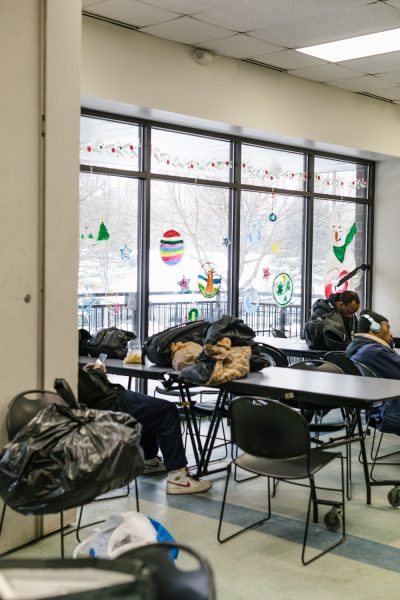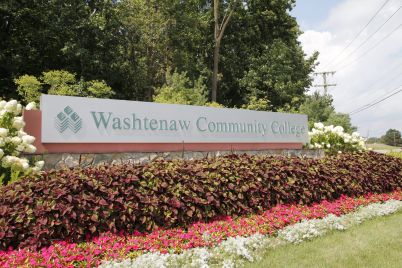
During the polar vortex this Winter, the Shelter Association of Washtenaw County increased their services by 40 percent. The Delonis Center in Ann Arbor was one of those shelters. Sara Faraj | Washtenaw Voice
Rachel Duckett
Contributor
During the “polar vortex” in the last week of January, the Shelter Association of Washtenaw County increased their services to ensure that no one would be left without shelter as temperatures plummeted.
Throughout the midwest, temperatures hit record breaking lows during the final week of January. As the arctic cold swept through Michigan, the week of January 28 was laden with cancelled school days and closed businesses.
For some, this meant a week spent at home drinking hot chocolate in pajamas. For the homeless community, the sub-zero temperatures meant a dire need for shelter.
According to Emmeline Weinert, the marketing and communications coordinator of the Shelter Association of Washtenaw County, a overnight shelter was added for two nights through Ann Arbor Public Schools to the usual 50 permanent beds available at the Delonis Center.
“We have had 367 unique individuals utilize our winter warming shelter services so far this season, and we have averaged around 80 individuals a night in warming shelters, which is in addition to the 50 individuals in our residential program beds,” said Weinert.
The Delonis Center also added 12 extra volunteers, and coordinated with Golden Limousine International and Ann Arbor Transportation Authority to provide free transportation to one of their many daytime warming centers, or rotating shelters, Weinert said.
“I’ve never seen a place so professionally run. No matter who comes in, these people never exchange their expressions,” said Reggie Smith, who has had a residential bed at the Delonis Center since leaving their treatment program last June.
“A large volume of the people who come in have extreme mental health issues,” Smith added. “I’m from Detroit; shelters there, it’s like a third world country.”
In order to extend their services to as many people as possible, the Delonis Center has also transitioned into a “low barrier” shelter, said Weinert, meaning people don’t need to pass a drug test, or have identification to be accepted into the shelter.
“The effect of no tolerance policy is that people that need it most don’t get services they need,” said Weinert.
Smith said the center took him in after he left treatment and was living on the street. He said they provided a place for him to rest after treatment, when there’s a higher chance of relapse.
Here at WCC, students can receive help finding housing resources at the student resource center.
“Each case is different which is why students are advantaged to see a case manager to have their situation triaged,” said Elizabeth Orbits, dean of student support services. She said students are often referred to the Delonis Shelter, Staples Family Shelter, SafeHouse and others.


